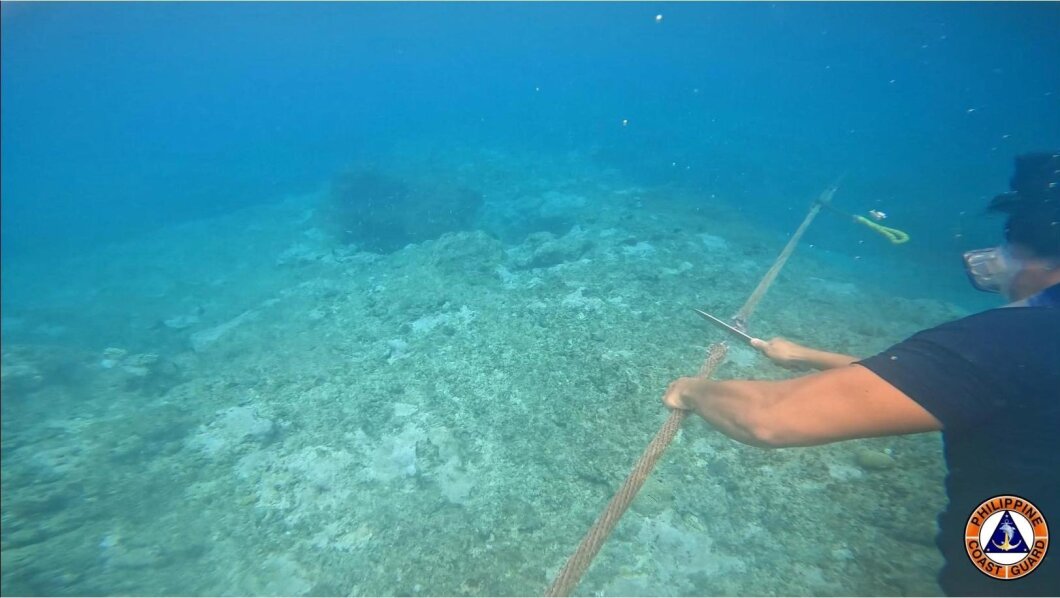
Philippine Coast Guard officials removed a “floating barrier” that China placed near a shoal prized by Filipino fishers, the latest confrontation in a maritime dispute with far-reaching geopolitical implications.
“The barrier posed a hazard to navigation, a clear violation of international law,” Philippine Coast Guard spokesman Jay Tarriela wrote on social media. “The decisive action of the PCG to remove the barrier aligns with international law and the Philippines’ sovereignty over the shoal.”
DEMOCRATS DIVIDED OVER BOB MENENDEZ’S FUTURE IN THE SENATE
Philippine President Ferdinand Marcos, Jr. ordered the removal of the buoys amid a running skirmish with Chinese Coast Guard forces attempting to prevent the delivery of supplies to Filipino fishers in the Scarborough Shoal. That action is part of a wider pattern of Marcos rebuffing Chinese attempts to assert sovereignty over waters that fall within the Philippines’ exclusive economic zone, a dispute unfolding against the backdrop of a mutual defense treaty requiring the United States to defend the Philippines in the event of a military crisis.
“We are closer than we’ve ever been,” Center for Strategic and International Studies senior fellow Gregory Poling, who directs the Asia Maritime Transparency Initiative, told the Washington Examiner. “And that’s just a simple math problem. There’s more frequent, dangerous interactions between Chinese law enforcement or Chinese militia and Philippine government vessels than there ever has been before.”

Those encounters are downstream from China’s attempt to claim control over almost the whole of the South China Sea, one of the most important waterways in the world, in defiance of a 2016 ruling by a court at The Hague.
“The 2016 Arbitral Award has affirmed that BDM is the traditional fishing ground of Filipino fishermen,” Tarriela said, using an acronym of an alternative name for the Scarborough Shoal. “Thus, any obstruction hindering the livelihoods of Filipino fisherfolk in the shoal violates the international law. It also infringes on the Philippines’ sovereignty over BDM.”
That removal coincided with a new rebuke from Beijing, which defended Chinese interference in the delivery of supplies to fishers in the area.
“China has indisputable sovereignty over the island and its adjacent waters and sovereign rights and jurisdiction over relevant waters,” Chinese Foreign Ministry spokesman Wang Wenbin asserted on Monday. “China Coast Guard did what was necessary to block and drive away the Philippine vessel. The steps it took were professional and restrained.”
Marcos is making a concerted effort to counter China’s encroachment on Philippine waters while also expanding military and diplomatic cooperation with the U.S., which views the Philippines as crucial territory for American forces tasked with fighting in any prospective conflict between the U.S. and China in the Indo-Pacific.
“We are grappling with both new and traditional threats to our people’s security, nowhere more acutely felt than in the Indo-Pacific region,” Marcos said in May during a visit to Washington. “And the Philippines sits squarely at the heart of the Indo-Pacific region. It is for this reason that I called for evolving our alliance to make it more responsive to present and emerging challenges. It is because national security is no longer simply about territorial defense. Economic security is national security.”
CLICK HERE TO READ MORE FROM THE WASHINGTON EXAMINER
His assertiveness has paid dividends, according to Poling, who said that Chinese Coast Guard forces tend to back down when Philippine officials ignore their nonlethal pressure.
“I think what Manila has been betting on — so far they’ve been right — is that China’s grey zone coercion relies on the other party blinking and backing off first,” Poling said. “If the position China’s put in is that the only way to prevent that is to use military force, China will back off, and that has so far worked out. This is of course a dangerous strategy, but standing up to a bully is always dangerous.”




